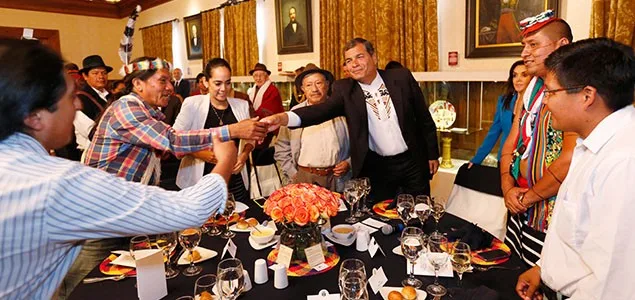Tariff opponents to join indigenous groups, unions in nationwide protests; march scheduled tomorrow in Cuenca and other cities
Tomorrow’s nationwide protest against government policies appears to be gaining momentum.
Originally planned as a series of marches by workers’ unions and indigenous groups, the protest is attracting other groups, including those opposed to new import tariffs imposed last week.
Opponents of the national government say the protests, planned for Quito, Cuenca and Guayaquil, and other cities, will be a measure of discontent against President Rafael Correa, who has enjoyed strong approval ratings since coming to office in 2007, but is now facing growing economic challenges due to the collapse in oil prices.
In Cuenca, union leader Messiah Tatamuez said he welcomes other groups to the march that will begin between 4 and 5 p.m. tomorrow at Parque San Blas and proceed up Simon Bolivar to Parque Calderon, where a rally will be held.
“This shows the level of discontent with government policies that many groups in Ecuador are feeling,” Tatamuez said.
Other organizers of the marches, especially in Quito, felt differently, however, and said they wanted to keep the focus on indigenous and union issues, as well as the right to protest. They said that right-wing opponents of the Correa government would not be welcome in the Quito march.
On Monday, Correa met with indigenous leaders opposed to the protests in the apparent hope of defusing the protests.
Protest organizers say the demonstrations grow out of a number of issues, including union concerns that the government is trying to divide union workers and worries that the administration is trying to criminalize protests. The new arrivals to the protest add opposition to import tariffs that they say will hurt employment and increase the cost of living.
“We want to show the discontent and dissatisfaction with the government’s policies and with attempts to criminalize protests,” said indigenous leader Carlos Perez, who is helping organize protests.
The president of the Confederation of Workers of Ecuador, Edgar Sarango, said the union is calling for the government to change its labor, economic and social policies.
“We are ready to hold talks but this requires the president and the government listen to all sectors,” Sarango said. “We cannot allow our rights to continue to be disrespected.”
Supporters of the demonstrations have taken to social media, calling for residents to “raise their voice” and participate in the protests.
President Correa has in the past accused critics of organizing street protests to destabilize his government, which protest leaders have denied.
The head of the pro-government “Central Unida de trabajadores,” Oswaldo Chica, said he believed the protests were political. “The protest has a political purpose, rather than an [interest] in defending workers,” Chica said.





















